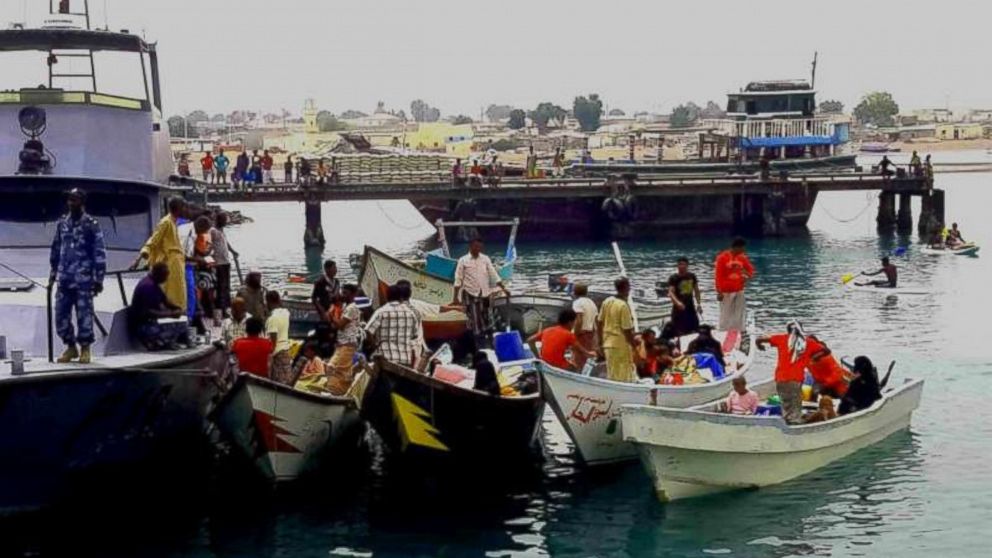Yemen Crisis ‘Getting Worse By The Hour’ as Americans Remain Trapped
As the country collapses, avenues of escape narrow for trapped Americans.

— -- DJIBOUTI – The crisis in Yemen is “getting worse by the hour,” the United Nations said today, as tens of thousands of people try to escape the rapidly disintegrating nation just across the Gulf of Aden.
“The current conflict in Yemen takes place against the backdrop of a humanitarian crisis of a protracted nature and of a size and a complexity which is amongst the largest in the world,” the United Nations Humanitarian Coordinator for Yemen, Johannes van der Klaauw, told reporters in Geneva, Switzerland.
It’s the poorest country in the Arab world – and before the recent conflict, more than 60 percent of the population required humanitarian assistance, according to Oxfam, one of the largest NGOs working on the ground. More than 13 million people do not have access to clean water and nearly nine million people are unable to access basic medical care.
The strengthening Saudi Arabian-led air campaign against the Iranian-backed Houthis now in control is systematically destroying much of the country’s infrastructure - “anything there was left” of basic services, including health care is all but gone, the UN says.
The International Red Cross and Doctors Without Borders have sent supplies and surgical teams into Aden, the epicenter of the recent violence, but it’s a dangerous trip.
On Friday from Amman, Jordan, UNICEF sent its first airlift of urgent medical supplies that will “make the difference between life and death for children and their families,” said UNICEF Yemen Representative Julien Harneis.
“But we know they are not enough, and we are planning more of these airlifts,” Harneis added.
Over the last 10 days, 317 Yemeni refugees have arrived here in Djibouti, but the UN predicts some 30,000 refugees in the next six months will arrive here and some 100,000 elsewhere in Africa.
Pakistan Votes to Stay out of Yemen Conflict as Aid Arrives
A Look at Nations Involved in Saudi-Led Airstrikes on Yemen
Some will arrive by air -- but most concerning, the agency said today, are those fleeing by sea from Aden -- a harrowing 24-hour, 178-mile boat ride across a key shipping route historically rife with pirates.
The UN refugee agency has appealed to all ships in the area to be “extra vigilant and assist any boats in distress” because there are no search and rescue operations in the Gulf of Aden.
“As demand increases, boats are likely to become more crowded and prices… more expensive,” the UN humanitarian coordinator warned.
The lucky ones here in Djibouti tell of horror back home. They say more people want to get out, according to the UN – but with most ports closed and boats being held on shore in Yemen, there are few remaining routes to safety.
Earlier this week, Air India operated evacuation flights, rescuing some 4,600 Indians and nearly 1,000 people from 41 countries including America, the Indian Ministry of External Affairs said.
When the U.S. Embassy in Sana’a shut its doors back in February, urging American citizens to get out of the country too, an unknown number of Americans stayed behind; now, they’re trapped.
More than 50 US citizens filed lawsuits this week against the State Department and Department of Defense for failing to evacuate them.
The Council on America-Islamic Relations (CAIR) filed the suit in Washington D.C., demanding the US government deploy “military ships, vessels and airplanes and/or contracting with private commercial ship liners and airplanes” to get Americans out. In Detroit, the American-Arab Anti-Discrimination Committee filed a suit on behalf of Wayne County residents. CAIR says more than 400 US citizens are trapped in Yemen.
Along with Asian Americans Advancing Justice, CAIR launched the website www.StuckInYemen.com to help identify those still left behind and #StuckInYemen is gaining momentum on Twitter.
Asked about America’s apparent unwillingness to evacuate its citizens, State Department acting Deputy Spokesperson Jeff Rathke told reporter’s at today’s briefing, "We remain in contact through a variety of means to advise American citizens in Yemen about the opportunities that present themselves for people to leave, if they choose to.”
Emergency messages posted on the U.S. Embassy in Sana’a’s website this week advise American citizens to inquire about flights with the International Organization of Migration or the Indian Embassy – but offered no further assistance.
On Thursday, the embassy message informed Americans that “an Indian naval vessel is currently in Hodeidah and will be departing tonight for Djibouti. Additionally, there is another Indian naval leaving Djibouti tonight bound for Aden. We do not have any contact for these vessels but have been told that U.S. citizen families, including Yemeni family members, will be allowed to board.”
Rathke continued at today’s briefing: “We are unfortunately in a situation where access to Yemen is extremely difficult and to do so with US government assets could put other lives at risk and so we are doing the best with the circumstances as they exist."
ABC’s Alexander Mallin contributed reporting from Washington.